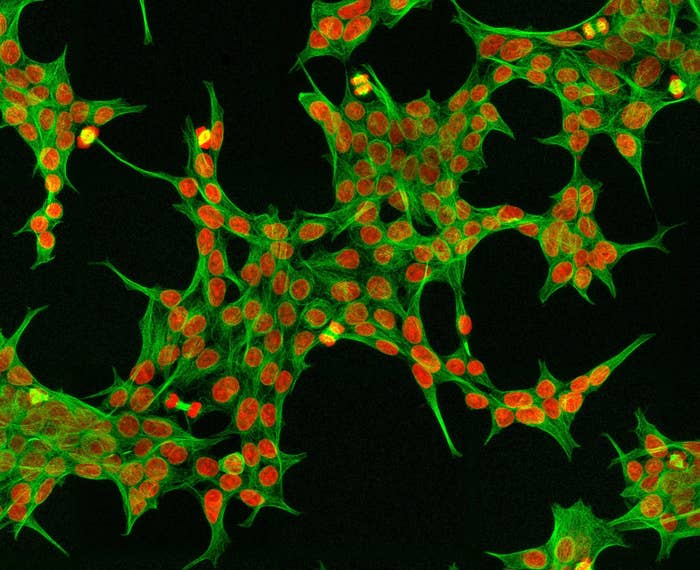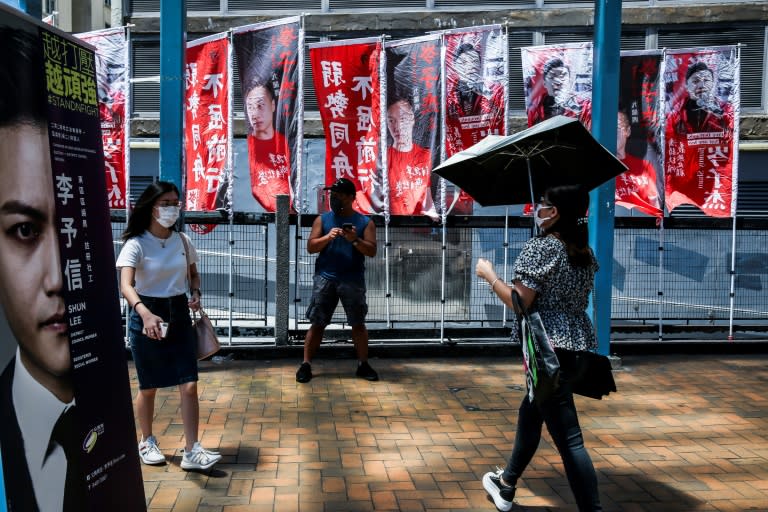“Conservation should never come at the expense of human rights and well-being.”
Tom Warren Investigations Correspondent
Posted on July 31, 2020,

Nurphoto / Getty Images
Sauraha, Chitwan National Park, Nepal, 2019.
After guards at a wildlife park funded by the World Wide Fund for Nature were accused of killing a 24-year-old Nepali man earlier this month, the leading conservation charity said it will "advocate for diligence" in the investigation.
The case bears striking resemblance to another alleged killing in Chitwan, highlighted in a 2019 BuzzFeed News investigation into the beloved megacharity’s funding of guards accused of human rights abuses. The series led WWF to overhaul its human rights policies, commission a sweeping internal review of its practices, and promise to take “swift and appropriate action” to address any “shortcomings uncovered by the review.”
ADVERTISEMENT
Raj Kumar Chepang died on July 22 after he was allegedly tortured by army personnel who help patrol the park, the Kathmandu Post reported.
The week before Kumar’s death, he and his friends were briefly detained by the army for collecting Ghongi, a type of snail considered a delicacy, the Post reported. His father told the newspaper that Kumar complained of “physical discomfort” after the army released him and later in the week went to the hospital, where he died. Police said they are waiting on the autopsy report which will confirm the cause of death.

Courtesy Chepang Family
Raj Kumar Chepang
A friend who said he was also detained told the newspaper the soldiers had beaten them, and also forced them to carry heavy wooden logs and do 100 push-ups. The Nepal army denied torturing or beating them.
WWF is "very troubled by these reports" and has “reached out to government authorities to understand the events that took place and urge that they are properly investigated,” a spokesperson told BuzzFeed News. “We understand the Government of Nepal has commenced such an investigation.”
“In our ongoing dialogue with government officials, WWF has emphasized that conservation should never come at the expense of human rights and well-being,” the WWF spokesperson added. “WWF has been and intends to remain in close contact with the Government of Nepal and advocate for diligence as they investigate these events and take appropriate steps to bring any perpetrators to justice.”
Chitwan National Park did not respond to a request for comment.
Multiple human rights groups have launched their own investigations, which will also probe the park’s alleged involvement in the forceful eviction of an Indigenous settlement living near its borders. Chitwan officials set fire to two huts, one of the organizations said in a statement, and destroyed eight others using elephants, leaving villagers homeless in the middle of the coronavirus pandemic.
“WWF must investigate this case seriously and ensure family justice,” said Praveen Kumar from THRD Alliance, one of the groups investigating Kumar’s death.
“The army only cares about animals,” said Birendra Mahato, the chair of the Tharu Cultural Museum and Research Center. “They are also supposed to support local people, but they are not serious about supporting marginalized communities.”
BuzzFeed News has previously detailed WWF’s decadeslong support for the armed guards that fight poaching at Chitwan National Park. During that time, Indigenous villagers have accused the guards of beatings, torture, sexual assaults, and killings. Park officials have confiscated their firewood and vegetables, they allege, and forced them into unpaid labor.
In 2006, several Chitwan anti-poaching guards were charged with murder after they arrested Shikharam Chaudhary without evidence and allegedly tortured him to death. Afterward, WWF’s staff on the ground in Nepal leaped into action — not to demand justice, but to lobby for the charges to disappear. When the Nepalese government dropped the case months later, the charity declared it a victory in the fight against poaching. WWF Nepal continued to fund the park and work closely with the rangers who were accused of his killing.
WWF Nepal later hired one of them to work for the charity. It handed a second, Kamal Jung Kunwar, a special anti-poaching award. By then Kunwar had written a tell-all memoir that described in detail how he used waterboarding as an interrogation technique.
Kunwar’s photo appeared in a January 2020 WWF Nepal blog post about the ongoing work the charity is doing to help fight poaching. WWF removed the post after BuzzFeed News reached out for comment.
WWF Nepal’s website says Chitwan National Park is funded in part by the United States Agency for International Development. USAID did not respond to a request for comment by press time. The charity doesn’t disclose how much money it spends on paramilitary anti-poaching forces and law enforcement.
American taxpayers have spent millions of dollars financing WWF-backed forces in areas where guards have been accused of rape and murder, according to documents obtained by BuzzFeed News. Some of the funds have gone to parks where WWF knew guards were accused of brutal abuses against local villagers — not the international poaching kingpins the charity says are its target.
The BuzzFeed News investigation found a pattern of abuses in national parks not just in Nepal but across Asia and Africa. Top executives at the World Wide Fund for Nature had personally reviewed detailed evidence that anti-poaching forces funded by the charity raped and tortured innocent people, but continued to support those forces.
The series spurred a bipartisan investigation and legislation that would prohibit the government from awarding money to international conservation groups that fund or support human rights violations. It also prompted reviews by the Government Accountability Office and the Interior Department, and separate government probes in the UK and Germany.
In April 2019, WWF appointed Navi Pillay, the former UN high commissioner for human rights, to chair its own inquiry into alleged abuses. The panel originally planned to publish its findings by the end of 2019 but did not do so. The panel did not respond to a request for comment.
MORE ON THIS
WWF Funds Guards Who Have Tortured And Killed People
Posted on July 31, 2020,

Nurphoto / Getty Images
Sauraha, Chitwan National Park, Nepal, 2019.
After guards at a wildlife park funded by the World Wide Fund for Nature were accused of killing a 24-year-old Nepali man earlier this month, the leading conservation charity said it will "advocate for diligence" in the investigation.
The case bears striking resemblance to another alleged killing in Chitwan, highlighted in a 2019 BuzzFeed News investigation into the beloved megacharity’s funding of guards accused of human rights abuses. The series led WWF to overhaul its human rights policies, commission a sweeping internal review of its practices, and promise to take “swift and appropriate action” to address any “shortcomings uncovered by the review.”
ADVERTISEMENT
Raj Kumar Chepang died on July 22 after he was allegedly tortured by army personnel who help patrol the park, the Kathmandu Post reported.
The week before Kumar’s death, he and his friends were briefly detained by the army for collecting Ghongi, a type of snail considered a delicacy, the Post reported. His father told the newspaper that Kumar complained of “physical discomfort” after the army released him and later in the week went to the hospital, where he died. Police said they are waiting on the autopsy report which will confirm the cause of death.

Courtesy Chepang Family
Raj Kumar Chepang
A friend who said he was also detained told the newspaper the soldiers had beaten them, and also forced them to carry heavy wooden logs and do 100 push-ups. The Nepal army denied torturing or beating them.
WWF is "very troubled by these reports" and has “reached out to government authorities to understand the events that took place and urge that they are properly investigated,” a spokesperson told BuzzFeed News. “We understand the Government of Nepal has commenced such an investigation.”
“In our ongoing dialogue with government officials, WWF has emphasized that conservation should never come at the expense of human rights and well-being,” the WWF spokesperson added. “WWF has been and intends to remain in close contact with the Government of Nepal and advocate for diligence as they investigate these events and take appropriate steps to bring any perpetrators to justice.”
Chitwan National Park did not respond to a request for comment.
Multiple human rights groups have launched their own investigations, which will also probe the park’s alleged involvement in the forceful eviction of an Indigenous settlement living near its borders. Chitwan officials set fire to two huts, one of the organizations said in a statement, and destroyed eight others using elephants, leaving villagers homeless in the middle of the coronavirus pandemic.
“WWF must investigate this case seriously and ensure family justice,” said Praveen Kumar from THRD Alliance, one of the groups investigating Kumar’s death.
“The army only cares about animals,” said Birendra Mahato, the chair of the Tharu Cultural Museum and Research Center. “They are also supposed to support local people, but they are not serious about supporting marginalized communities.”
BuzzFeed News has previously detailed WWF’s decadeslong support for the armed guards that fight poaching at Chitwan National Park. During that time, Indigenous villagers have accused the guards of beatings, torture, sexual assaults, and killings. Park officials have confiscated their firewood and vegetables, they allege, and forced them into unpaid labor.
In 2006, several Chitwan anti-poaching guards were charged with murder after they arrested Shikharam Chaudhary without evidence and allegedly tortured him to death. Afterward, WWF’s staff on the ground in Nepal leaped into action — not to demand justice, but to lobby for the charges to disappear. When the Nepalese government dropped the case months later, the charity declared it a victory in the fight against poaching. WWF Nepal continued to fund the park and work closely with the rangers who were accused of his killing.
WWF Nepal later hired one of them to work for the charity. It handed a second, Kamal Jung Kunwar, a special anti-poaching award. By then Kunwar had written a tell-all memoir that described in detail how he used waterboarding as an interrogation technique.
Kunwar’s photo appeared in a January 2020 WWF Nepal blog post about the ongoing work the charity is doing to help fight poaching. WWF removed the post after BuzzFeed News reached out for comment.
WWF Nepal’s website says Chitwan National Park is funded in part by the United States Agency for International Development. USAID did not respond to a request for comment by press time. The charity doesn’t disclose how much money it spends on paramilitary anti-poaching forces and law enforcement.
American taxpayers have spent millions of dollars financing WWF-backed forces in areas where guards have been accused of rape and murder, according to documents obtained by BuzzFeed News. Some of the funds have gone to parks where WWF knew guards were accused of brutal abuses against local villagers — not the international poaching kingpins the charity says are its target.
The BuzzFeed News investigation found a pattern of abuses in national parks not just in Nepal but across Asia and Africa. Top executives at the World Wide Fund for Nature had personally reviewed detailed evidence that anti-poaching forces funded by the charity raped and tortured innocent people, but continued to support those forces.
The series spurred a bipartisan investigation and legislation that would prohibit the government from awarding money to international conservation groups that fund or support human rights violations. It also prompted reviews by the Government Accountability Office and the Interior Department, and separate government probes in the UK and Germany.
In April 2019, WWF appointed Navi Pillay, the former UN high commissioner for human rights, to chair its own inquiry into alleged abuses. The panel originally planned to publish its findings by the end of 2019 but did not do so. The panel did not respond to a request for comment.
WWF Funds Guards Who Have Tortured And Killed People
Tom Warren · March 4, 2019
Tom Warren · Dec. 11, 2019
Tom Warren · July 11, 2019
The EU Has Found “Shortcomings” In WWF’s Treatment Of Indigenous People At A Proposed Nature Reserve
Tom Warren · May 12, 2020

Katie Baker is an investigative reporter for BuzzFeed News and is based in London.

Tom Warren is an investigations correspondent for BuzzFeed News and is based in London.









 A military honor guard lays the U.S. flag on the casket of Rep. Elijah Cummings during his funeral service on October 25, 2019 in Baltimore, Maryland.
A military honor guard lays the U.S. flag on the casket of Rep. Elijah Cummings during his funeral service on October 25, 2019 in Baltimore, Maryland.









